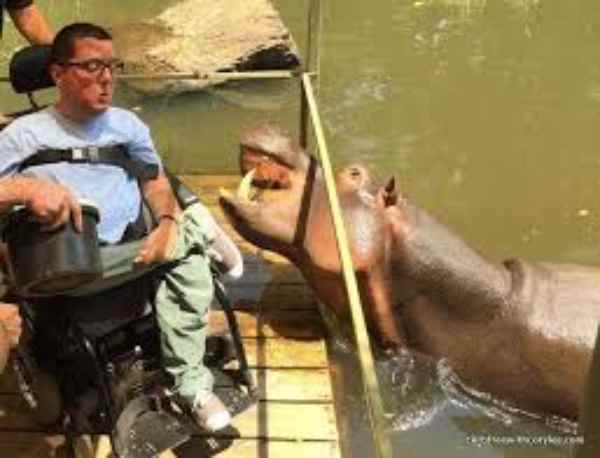Hippos, those colossal creatures inhabiting the rivers and lakes of sub-Saharan Africa, often evoke images of peaceful herbivores calmly wallowing in the water. However, beneath their seemingly gentle demeanor lies a surprising truth – hippos are one of the most dangerous and formidable animals in the animal kingdom. Contrary to popular belief, these magnificent creatures can pose a significant threat to human life and have been responsible for numerous deadly encounters throughout history.
In this article, we will delve into the reasons why are hippos dangerous, exploring their aggressive behavior, territorial nature, and impressive physical attributes that make them a force to be reckoned with. By understanding the inherent risks associated with encounters with hippos, we can develop a greater appreciation for their power and ensure our safety when venturing into their habitats.
Are Hippos Dangerous? Do They Attack Humans?
Hippos, also known as river horses, are incredibly dangerous to humans. Despite their seemingly slow and docile nature, these large animals are responsible for about 500 deaths per year in Africa alone. This number is staggering and proves that hippos are some of the deadliest land animals in the world. In fact, they have earned a reputation for being extremely aggressive and territorial, especially when it comes to protecting their young.
How Dangerous Are Hippo Attacks?

If you ever find yourself near a hippo, it’s best to keep your distance. These massive creatures may not seem particularly threatening, but they can be incredibly dangerous if they feel threatened. Hippos are not typically territorial on land, but they are quick to respond if they feel that their space is being invaded. Unfortunately, even if you manage to outrun a charging hippo, escaping alive is still far from guaranteed. These massive beasts can run at speeds of up to 20 mph, making it nearly impossible for a human to outrun them.
Hippos can be incredibly dangerous when encountered in their natural element — water. While they may seem docile while lounging on the riverbank, these massive creatures can quickly become territorial when threatened. Hippos tend to hang out in specific stretches of water, around 55-110 yards from the shore. When they sense an intruder in their turf, they won’t hesitate to defend themselves.
Hippos are known to have an aggressive nature, especially when threatened or feeling territorial. Unfortunately, the most common hippo attacks are those that occur in water, with humans on boats being the primary victims. What makes the situation even more perilous is that hippos are usually submerged, making them harder to spot from the surface. An unsuspecting human may float by while fishing, unaware of the massive animal resting below the water. Suddenly, without warning, the hippo will launch itself towards the boat, quickly capsizing it. Once a human is in the water, it’s nearly impossible to defend against a hippo attack.
A hippo attack can result in various fatal outcomes for a human. The most common ways are through crushing or biting. Additionally, if the encounter occurs in the water, there is also a risk of drowning.
What Other Animals Do Hippos Attack?

Hippos harbor no grudge against humans; they are merely unpredictable and prone to attacking intruders. However, do hippos pose a threat to other wild animals?
Apart from humans, hippos are known to target lions, hyenas, and crocodiles. Normally, lions and hyenas steer clear of hippos due to the danger posed by an adult hippo capable of easily overpowering an entire pack of either predator. Nonetheless, there are occasional instances where desperate lions and hyenas might single out an isolated hippo and attempt to take it down. Such encounters typically yield little success, as hippos are adept at defending themselves.
Hippos most frequently encounter crocodiles, as they share common territories, making conflicts more likely. However, in general, the two species coexist with relatively little friction. Nevertheless, there are occasional instances of violence arising from such interactions. When a female hippo has a calf, any intruding crocodiles are promptly chased away. If the crocodiles persist despite the warning, it is not uncommon for a hippo to take more drastic measures, even resorting to killing the persistent and bothersome crocodile.
What Makes Hippos Dangerous?
What makes hippos dangerous? Their lethal nature can be attributed to two key factors: their tusks and their immense weight.
Hippos possess formidable tusks that grow from modified front teeth in their mouths. These tusks include elongated incisors (similar to human front teeth) and canines (akin to sharp corner teeth). These tusks can exceed a foot in length, composed of incredibly hard ivory that even surpasses the toughness of an elephant’s tusks. What’s more, they continuously grow and are honed to a razor-sharp edge as they grind against each other, amplifying their deadly potential. While primarily used by hippos to battle other males, they will also employ these tusks to attack intruders.
Apart from their menacing tusks, the sheer size of a hippo adds to their formidability. On average, these creatures weigh around 3,300 lbs, but large males never cease growing. Even without deploying their tusks, a mere accidental bump from a hippo can easily break bones. In the event of an all-out attack, their colossal weight becomes a lethal force capable of inflicting fatal injuries.
Where Do Hippo Attacks Happen?
In Africa, hippo attacks are a concern, especially among the local fishing communities. Let me share a gripping segment that recounts a hippo encounter with fishermen in Kenya:
During this intense incident, a curious hippo crossed paths with local fisherman Babu. In a heart-stopping moment, the massive creature sunk its tusks into Babu’s back three times, leaving everyone on edge. These encounters predominantly occur when humans venture too close to the hippos’ territory along the shoreline or when they unknowingly float by them in boats.
How Can You Avoid A Hippo Attack?
If you don’t have any upcoming travel plans to an African country where hippos roam, you should be just fine. However, if you’ve already made such arrangements, it’s crucial to steer clear of areas frequented by these massive creatures. Spotting a hippo and witnessing it yawn is a warning sign of aggression, indicating that you are too close for comfort. During the mating season, male hippos can be especially aggressive, so exercise caution during this time. Most importantly, keep your distance from hippo calves – a mother’s instinct to protect her young is fierce, and she won’t hesitate to act if she perceives any threat to her precious offspring. Stay safe and informed while exploring the wild wonders of Africa!
FAQ’s
Why are hippos so dangerous to humans?
Hippos are widely considered the most dangerous large mammals in Africa, responsible for more human deaths per year than any other wild animal on the continent. Despite their seemingly docile demeanor, these formidable herbivores weighing up to 4,500 kg are extremely territorial and highly aggressive when provoked. Hippos have been known to charge at boats and humans who venture too close to the water’s edge, causing severe injuries or even death.
Can humans outrun a hippo?
The answer is no. Although hippos may not look like the fastest runners, they can reach speeds of up to 30 km/h over short distances.
Reference
- https://www.nationalgeographic.com/animals/article/hippos-flooding-fishing-covid-collide-kenya
- https://www.theguardian.com/world/2011/nov/14/pet-hippo-humphrey-kills-owner
A motivated philosophy graduate and student of wildlife conservation with a deep interest in human-wildlife relationships, including wildlife communication, environmental education, and conservation anthropology. Offers strong interpersonal, research, writing, and creativity skills.










